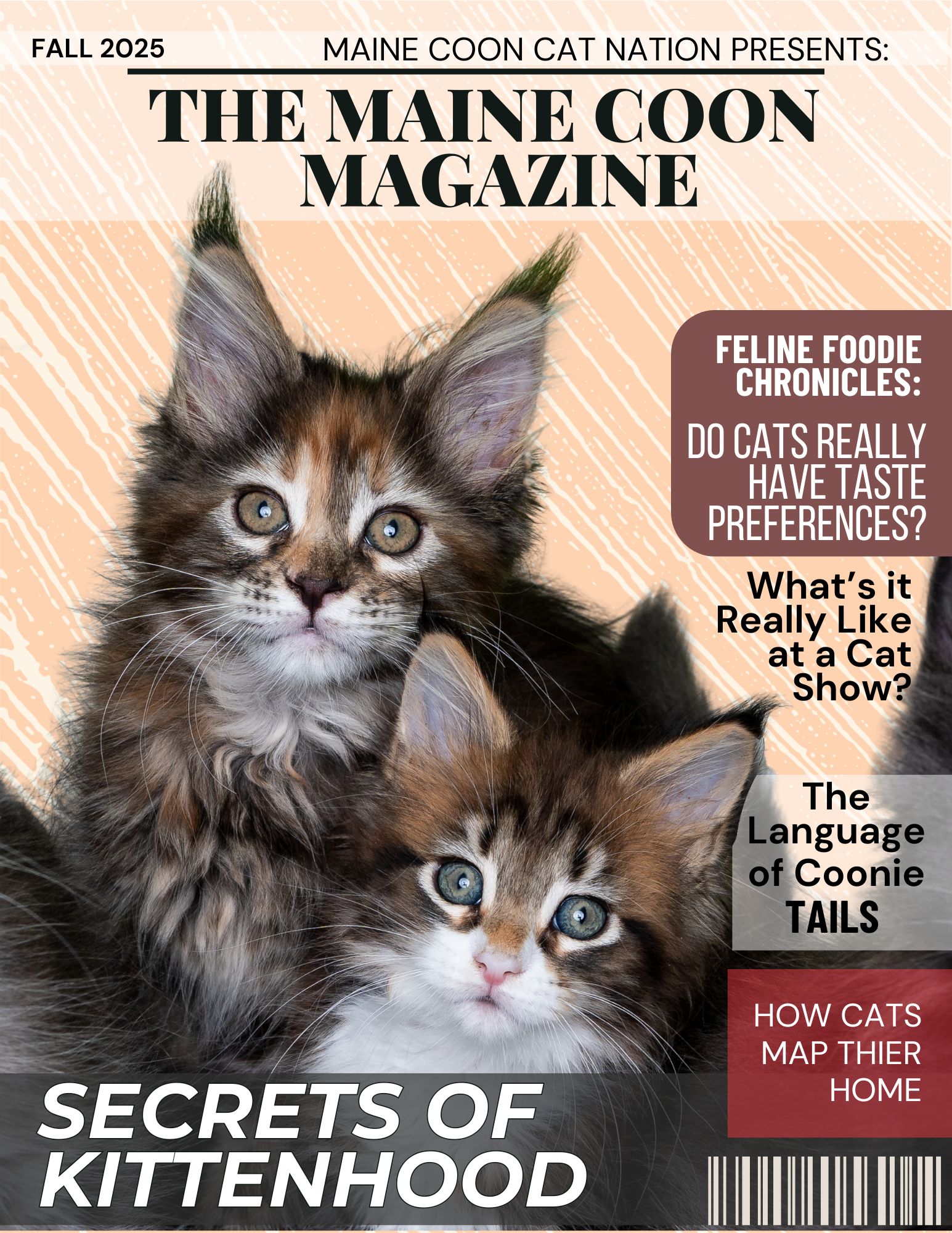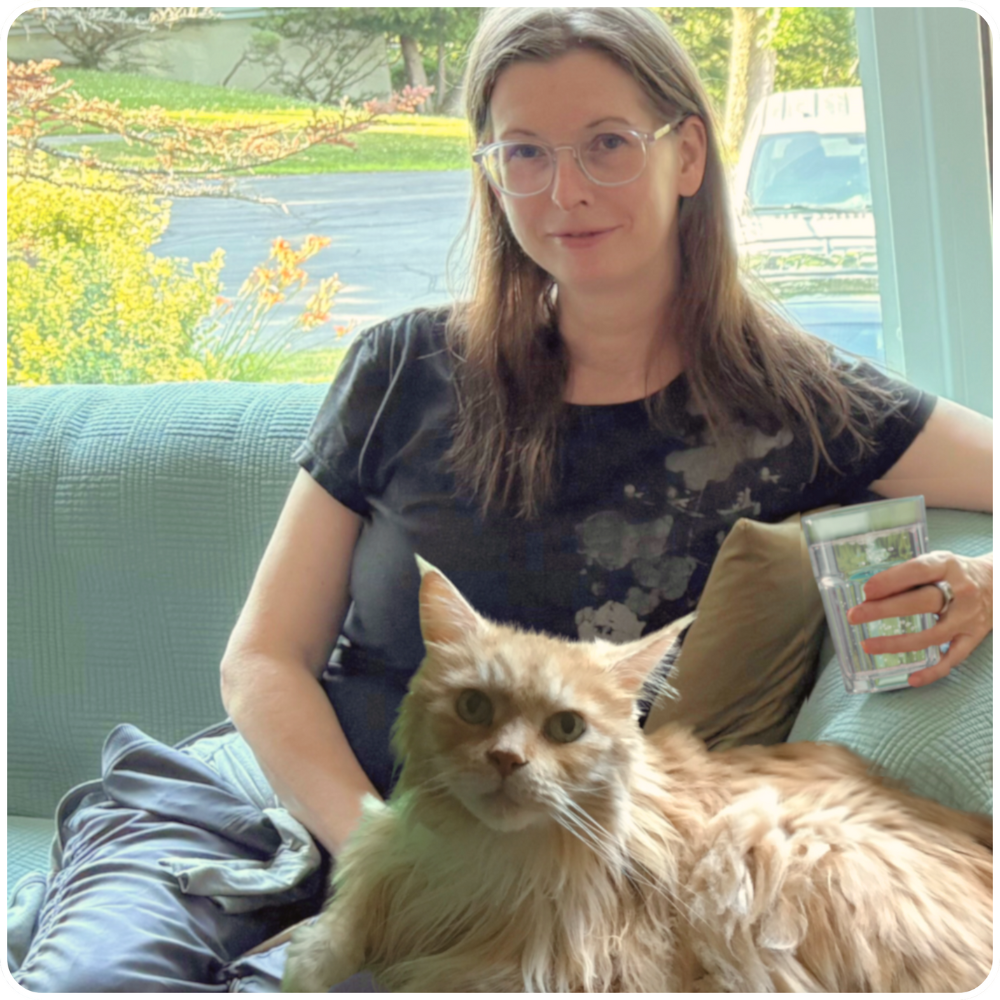- Home
- About Maine Coon Cats
- Female Maine Coon Cats
Female Maine Coon Cats:
Let's Hear it For The Girls!
Female Maine Coon Cats are in a league of their own! In a cattery, a breeder has purebred mother cats: Queens. Let's discuss their size and personality traits!
In a cattery, "queens" refers to Maine Coon girls that are used for breeding purposes.
If you like this, you'll love our fun, free Daily Digest!

If you like this, you'll love our fun, free Daily Digest!

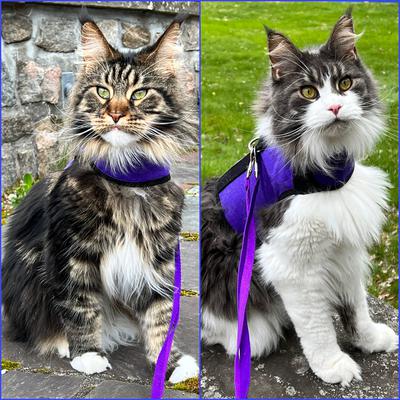 Violet and Khaleesi
Violet and KhaleesiGirl Coonies are typically chosen to be Queens based on their desirable traits and characteristics that conform to the standards set by the breed's governing body, such as breed associations or registries like The International Cat Association (TICA) or the Cat Fanciers' Association (CFA).
This is what is meant by the term "breed standard."
Queens play a vital role in producing litters of purebred kittens that maintain the breed's standards and qualities.
Whether your female Maine Coon is a queen or not, there is a lot to know about these beautiful girls! Let's talk about their size, health, care and more.
How Large Do Female Maine Coon Cats Typically Get?
"What is the average weight and size of a female Maine Coon?"
As one of the largest domestic cat breeds (the largest, if you don't count the Savannah, which is a cross-breed), size is always the first topic people generally ask about.
The Maine Coon Cat's size is often one of the main reasons folks choose this breed.
The average weight range for a Female Maine Coon is between 8 to 12 pounds (3.6 to 5.4 kilograms). Some females can weigh slightly less or more, generally falling within a range of 7 to 14 pounds (3.2 to 6.4 kilograms).
Size:
- Length: They can measure between 10 to 16 inches (25 to 41 centimeters) in height at the shoulder.
- Body Length: From the nose to the base of the tail, they usually range from 19 to 40 inches (48 to 101 centimeters), including their bushy tail.
- Tail Length: Their tails alone can be quite long, measuring between 12 to 18 inches (30 to 46 centimeters). Tail growth and proportions are covered here.
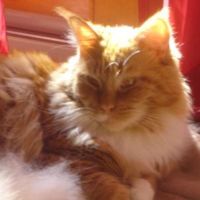 Gingersnap
GingersnapIt's important to note that both male and female Maine Coon cats tend to grow more slowly than other breeds.
This slow growth rate means that often they don't reach their full size until they're about 3 to 5 years old.
Much like in human children, the growth is more noticeable when they are younger, and slows down as time goes on.
Additionally, their large size can be influenced by genetics, diet, and overall health.
Temperament of Female Maine Coon Cats:
Female Maine Coon cats are known for their friendly, affectionate, and sociable nature. They tend to be gentle and loving, forming strong bonds with their owners.
This breed is often described as being "dog-like" due to their loyal and playful demeanor.
They enjoy being involved in family activities and are known for their curious and intelligent behavior.
Differences from Male Maine Coons: While both male and female Maine Coons share many of the breed’s characteristic traits, there are some differences in their friendly personalities:
- Females: Often considered to be more reserved and independent compared to males. They can be more selective about whom they bond with but are very affectionate once trust is established. Female Maine Coons may exhibit a slightly calmer and less boisterous demeanor.
- Males: Typically more outgoing and social with a more playful and sometimes mischievous nature. Males are often described as being more "in-your-face" affectionate, seeking constant attention and interaction.
Caveat: These stereotypes should be taken with a grain of salt. Most owners of a female Maine Coon cat will be the first to say that their girl is outgoing, goofy, playful, and extremely loving.
Girl or boy, all Maine Coons usually have a laid-back personality.
Interaction with Children and Other Pets: Female Maine Coon cats are generally very good with children and other pets!
Their gentle and patient nature makes them well-suited for households with kids.
These "dogs of the cat world" are tolerant of children's antics and are less likely to scratch or bite in response to rough handling.
Of course, as with any pet, it is important to teach children how to interact respectfully with the animal.
When it comes to other pets, female Maine Coons usually get along well with other animals, including dogs and other kitties.
Their sociable and non-aggressive disposition helps them blend smoothly into multi-pet households.
Proper introductions and gradual introductions are important to set the stage for relationships with other pets.
Female Maine Coon cats are affectionate, gentle, and sociable, making them excellent companions for families, including those with children and other pets. Their loyal and loving nature makes them cherished members of any household.
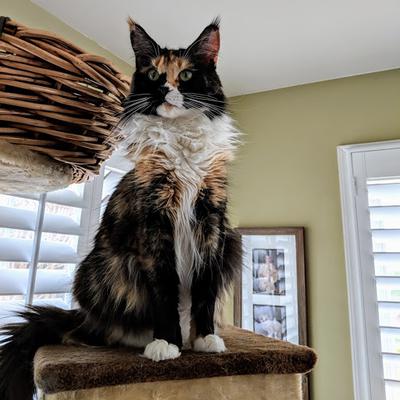 Flashdance
FlashdanceFlashdance’s stunning tri-color coat is a classic example of calico. Interestingly, this pattern is found almost exclusively in females! Learn more about calico genetics here.
About Maine Coon Queens and Catteries:
"What is a Cattery?"
A cattery can be a facility where felines are bred and/or boarded. It's essentially a specialized establishment for cats, similar to how a kennel is for dogs.
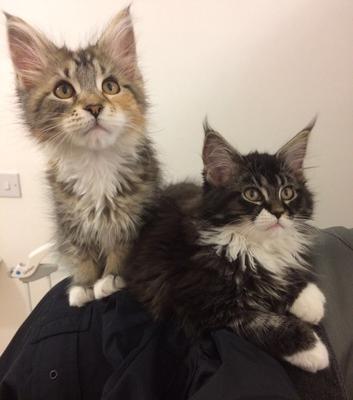 Tess and Khaleesi
Tess and KhaleesiIn a breeding context, catteries are where purebred cats are carefully selected, paired for mating, and where pregnant female Maine Coons (queens) are cared for until they give birth.
The facility is designed to ensure the health, safety, and well-being of the animals, with appropriate amenities and veterinary care.
In the context of boarding, catteries provide temporary accommodation for felines while their owners are away, offering food, shelter, and sometimes additional services such as grooming or medical care.
What is an In-Home Cattery?
An in-home cattery typically refers to a breeding operation or living arrangement where cats are kept and cared for within the breeder's home.
In this setup, the cats are often considered part of the family and are treated with care and affection. This is what you are looking for!
The breeder may have a limited number of cats, often focused on one or a few specific breeds, and is typically involved in all aspects of their lives, from breeding and raising kittens to providing ongoing care and attention.
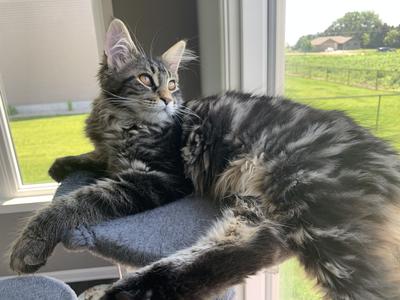 Lily
LilyIn-home catteries are often characterized by a more intimate and personal environment compared to larger commercial catteries.
They may offer potential advantages such as closer interaction between the breeder and the animals, more individualized attention, and a greater emphasis on socialization and temperament development.
Breeding beautiful Maine Coon kittens in an in-home cattery setting requires careful planning, dedication, and a commitment to the well-being of the animals involved.
The breeder must ensure that the kittens are healthy, properly socialized, and receive appropriate veterinary care.
Additionally, responsible breeders often prioritize finding loving and suitable homes for their kittens, ensuring that they go to families who can provide them with the care and attention they need throughout their lives.
An important part of the selective breeding program includes genetic screening for potential health concerns like hip dysplasia and hypertrophic cardiomyopathy (HCM).
Reputable breeders make sure not to pass down genetically inherited conditions, so this is a good reason to research your breeder when looking for a new kitten.
Breeding purebred Maine Coons is an expensive undertaking which requires devotion and commitment!
About Maine Coon Queens:
Breeding female Maine Coon cats, or queens, involves careful planning and responsible care to ensure their health and the well-being of their kittens. Here are some interesting aspects:
Age for Breeding
- First Breeding: Females should ideally be bred for the first time when they are fully mature, typically between 18 months to 2 years old. This allows them to reach full physical and emotional maturity.
- Last Breeding: It is generally recommended to retire queens from breeding by the age of 5 to 6 years. Breeding beyond this age can increase health risks.
Frequency of Breeding
- Heat Cycles: Queens come into heat every 2 to 3 weeks during the breeding season, which can be nearly year-round for indoor kitties.
- Breeding Interval: To maintain optimal health, it is advisable to allow a queen to have no more than one to two litters per year. Continuous breeding without sufficient recovery time can lead to health issues and stress
Number of Litters
- Lifetime Litters: A responsible breeding practice might involve a queen having around 3 to 4 litters over her breeding career. This ensures she remains healthy and reduces the risk of complications associated with frequent pregnancies.
Litter Size
- Average Litter: The typical litter size for a Maine Coon ranges from 3 to 6 kittens, though this can vary.
Veterinary Care
- Pre-Breeding Check-up: Before breeding, queens should undergo a thorough veterinary examination, including genetic testing for hereditary conditions, vaccinations, and parasite control.
- Pregnancy Monitoring: Regular vet visits during pregnancy help monitor the queen's health and the development of the kittens. An ultrasound or X-ray may be used to check on the kittens.
- Nutrition: Pregnant and nursing queens require a diet rich in nutrients. High-quality food formulated for pregnancy and lactation should be provided.
- Birthing Support: Veterinary support during labor (queening) may be necessary if complications arise. Post-birth, the vet will check the queen and kittens to ensure they are healthy.
- Postpartum Care: After birth, the queen should be monitored for signs of mastitis, retained placenta, or other postpartum issues. Regular vet check-ups and appropriate care are crucial.
Breeding female Maine Coon cats requires careful timing, limited frequency, and comprehensive veterinary care.
Regular veterinary care, proper nutrition, and attentive monitoring throughout the breeding process are essential for responsible breeding practices.
Have you ever heard of adopting a retired queen? Since a female Maine Coon has many more years to live a fulfilling life in her forever home after she's had her last litter of kittens, she may become available for adoption at this time.
Spaying Female Maine Coons:
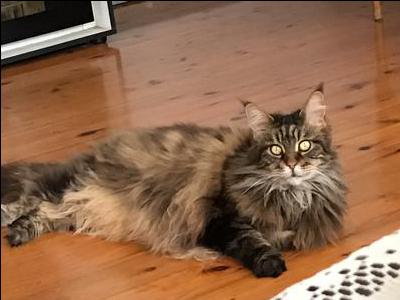
Spaying a female Maine Coon is an important step in ensuring her health and well-being. Any Coonie who is not a queen in a cattery should be spayed.
The ideal time to spay a female Maine Coon cat is generally between 4 to 6 months of age.
Here are some considerations for determining the best time for spaying:
Optimal Age for Spaying
The common recommendation for spaying is before the kitten reaches sexual maturity, which typically occurs around 6 months of age.
Spaying at this age can prevent unwanted behaviors associated with heat cycles and reduce the risk of certain health issues.
Health Benefits of Early Spaying
Prevention of Heat Cycles:
Spaying before the first heat cycle eliminates the behaviors and potential stress associated with estrus.
Reduced Risk of Health Issues:
Early spaying significantly reduces the risk of developing mammary tumors, ovarian cancer, and uterine infections (pyometra).
Population Control:
Preventing accidental litters helps control the population of unwanted cats and kittens.
Considerations for Timing
Weight and Health:
Ensure your Maine Coon is at a healthy weight and free from any illnesses before the surgery.
Veterinary Advice:
Consult your veterinarian to determine the best timing based on your cat's health, development, and individual needs.
Post-Surgery Care
Recovery Time:
Provide a quiet, comfortable space for your cat to recover after surgery. Follow your veterinarian's post-operative care instructions, including managing pain and preventing excessive activity.
Monitor for Complications:
Keep an eye on the incision site for signs of infection or complications and contact your vet if you notice anything unusual.
Female Maine Coon Health Considerations:
Reproductive Health
There are several health considerations specific to females. Understanding these can help ensure the overall health and well-being of your female Maine Coon.
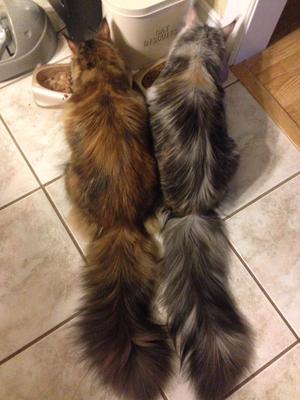 Callie and Moxie
Callie and Moxie- Pyometra: A serious and potentially life-threatening infection of the uterus, common in unspayed female cats. Spaying eliminates this risk.
- Mammary Tumors: Female cats are at risk for developing mammary (breast) tumors, especially if they are not spayed. Spaying before their first heat cycle significantly reduces this risk.
- Ovarian and Uterine Cancer: Spaying also prevents ovarian and uterine cancers.
Urinary Tract Health
- Urinary Tract Infections (UTIs): Female cats are prone to UTIs due to their shorter urethras compared to males. Symptoms include frequent urination, blood in urine, and discomfort while urinating.
- Feline Lower Urinary Tract Disease (FLUTD): This condition encompasses a variety of urinary issues that can affect female cats, including cystitis and bladder stones.
Hormonal Changes
- Heat Cycles: Unspayed female cats go through heat cycles which can cause behavioral changes such as increased vocalization, restlessness, and marking territory. Spaying eliminates these cycles.
- Post-Spaying Hormonal Adjustments: After spaying, some female cats might experience changes in metabolism and appetite. Monitoring their diet and weight is important to prevent obesity.
Pregnancy and Nursing
- Pregnancy Complications: Maine Coon females can experience complications during pregnancy and birth, such as dystocia (difficult labor) and eclampsia (low calcium levels).
- Nursing Issues: Lactating queens can develop mastitis, an infection of the mammary glands.
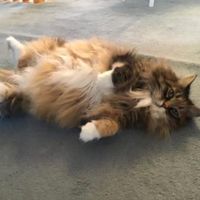 Lacey
LaceyFemale Maine Coon cats, like all breeds of cats, have specific health considerations related to their reproductive system, urinary tract, and hormonal changes.
Spaying not only helps prevent many of these issues but also contributes to a longer and healthier life.
With regular veterinary care, a balanced diet, and attention to any behavioral changes, you should expect a long and healthy life with your female Maine Coon!
Frequently Asked Questions (FAQ's):
"What is the personality of a female Maine Coon cat?"
"What is the personality of a female Maine Coon cat?"
Female Maine Coon cats are affectionate, gentle, and sociable, making them excellent companions for families, including those with children and other pets.
While they may be slightly more reserved and independent compared to males, this sweeping generalization may not be true in your case or even noticeable in general.
Their loyal and loving nature makes them cherished members of any household.
"How much is a female Maine Coon?"
"How much is a female Maine Coon?"
The cost of a male or female Maine Coon cat can range from $800 to over $5,000, depending on various factors.
In the vast majority of circumstances, expect to pay in the thousands. Prospective owners should be prepared for this investment and ensure they are purchasing from a reputable breeder to get a healthy and well-socialized kitten.
"What is the life expectancy of a Maine Coon female?"
"What is the life expectancy of a Maine Coon female?"
The life expectancy of a Coonie, whether male or female, is generally between 12 and 15 years, though some can live into their late teens (and occasionally early 20's!) with proper care.
Like any breed, their lifespan can be influenced by various factors, including genetics, diet, exercise, and access to regular veterinary care.
Keeping her indoors is the most influential factor to extend her life expectancy.
"All in all, what is a female Maine Coon like?"
"All in all, what is a female Maine Coon like?"
Amazing! Maine Coon girls are sweet, loving, often cuddly, vocal, smart, friendly and everything you would expect from one of these gentle giants.
Every owner of a female Maine Coon who has contributed a photo, story or testimonial in our community has been head over heals for their girl!
